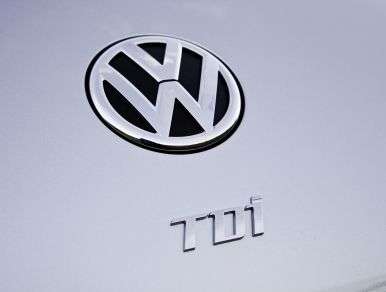Recent Articles
Popular Makes
Body Types
Road Test and Review - 2013 Volkswagen Beetle TDI
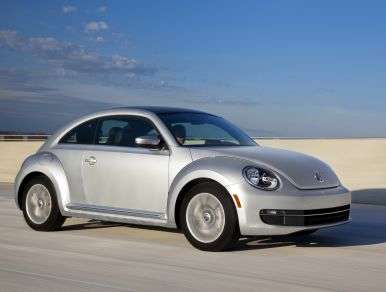
Volkswagen is all about increasing its market share in a bid to capture the title of ‘world’s largest automaker.’ A key component of this expansionist strategy is the ability to extend its tendrils into as many product niches as possible in order to lure in buyers seeking a vehicle that is the perfect fit for their particular lifestyle and needs.
The 2013 Volkswagen Beetle TDI represents the embodiment of the new VW, a design that has matured from its kitschy neo-classic roots into a legitimate contender for those who simply want a stylish compact coupe. The introduction of a turbodiesel drivetrain under its hood for 2013 gives VW three strong power plants with which to tempt potential buyers and further solidify its lead as the number one provider of affordable diesel cars in the United States.
The pursuit of mass-market appeal, however, has revealed some cracks in VW’s reputation for providing an upscale vehicle experience at a bargain price, as well as raised questions concerning the real world efficiency of its turbodiesel technology in cold weather climates. Facing down competitors such as the Hyundai Genesis Coupe, the Honda Civic Coupe, and a host of interesting hatchback options from Ford, Mazda, and even its VW Golf stable mate, the Beetle TDI is not a clear-cut choice for those who desire an economical daily driver.
2013 Volkswagen Beetle TDI: Models and Prices
The 2013 Volkswagen Beetle TDI is offered in three distinct trim levels. The base TDI (MSRP $23,495) features a leather-wrapped steering wheel, a trip computer, keyless entry, cruise control, power windows, and satellite radio, while the TDI with Sunroof (MSRP $25,195) adds not just the titular roof opening but also a touchscreen sound system as well as HD radio. The TDI with Sun, Sound and Nav (MSRP $26,545) includes the contents of the TDI with Sunroof trim as well as a touchscreen navigation system and a Fender audio system. The vehicle we drove for a week was a Canadian-market base Beetle TDI, which was slightly de-contented compared to the American trim (no keyless entry).
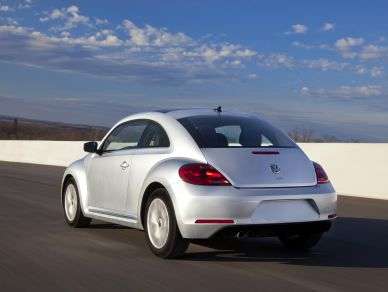
2013 Volkswagen Beetle TDI: Design
- The 2013 Volkswagen Beetle TDI is identical to the 2012 model.
The 2013 Volkswagen Beetle TDI’s recent re-engineering effort has allowed it to graduate from ‘cute’ to ‘attractive,’ a feat achieved via the decision to build a modern car informed by its history, rather than defined by it. The 2013 Beetle TDI is firmly anchored in the modern era, and while aspects of its hood and fenders might pay homage to the original Beetle shape, the flatter roof and hood along with the inclusion of sharper lines along the sides of the vehicle give it a fighting chance to take down competitors based on looks alone.
After reveling in the detail and care taken to present a fresh face to the outside world via the Beetle TDI’s exterior styling, we are unable to describe the coupe’s interior trim as anything other than disappointing. The entry-level TDI model that we drove was as plain as could be from a trim perspective, assaulting the eyes with garish, red plastic steering wheel spokes and equally hard-to-the-touch plastic pieces at the top of the doors and intruding into the rear passenger compartment. In addition, the vehicle’s stereo system was one piece of the car that looked like it would have been more at home in the first-generation New Beetle than the latest and greatest version of the car. It’s possible to remedy at least a few of these issues by upgrading trims and signing over a larger monthly payment to VW, but the lack of basic niceties is one of the best illustrations of how cost-cutting in favor of increased volume is affecting Volkswagen’s design reputation.
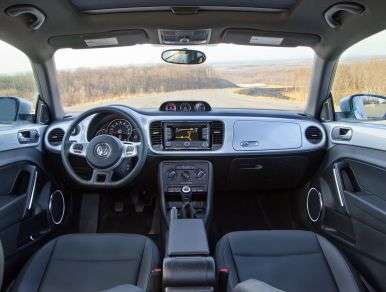
2013 Volkswagen Beetle TDI: Comfort and Cargo
- The 2013 Volkswagen Beetle TDI is identical to the 2012 standard Beetle in terms of its available comfort and cargo features.
Despite its plain presentation, the 2013 Volkswagen Beetle TDI delivers in most of the important areas when it comes to passenger comfort. Dull as it might be, the Beetle’s dashboard is laid out logically enough, and we never found ourselves reaching for an awkwardly-placed button or switch. The driver and passenger’s seats (upholstered in cloth in our tester) were quite comfortable and offered ample leg and headroom – adjectives that can’t necessarily be applied to the vehicle’s usable, but tight rear quarters. The Beetle TDI is a coupe, not a family conveyance, and most buyers interested in this type of car are well aware of the fact that its backseat is intended for occasional use. Cargo space under the rear hatch is adequate for a pair of passengers, expanding to up to 29.9 cubic feet with the rear row folded forward, but falls short of most hatchbacks in its price range.
We did have one complaint about the layout of the Beetle TDI’s center console. The parking brake, which is located directly beside the driver, also happens to be situated underneath the vehicle’s one armrest. For all practical purposes, it is impossible to deploy the parking brake without having to put the armrest up first, which virtually guarantees no parking lot shenanigans or epic drifts through slippery corners. More importantly, it’s a very awkward design decision that had us routinely jamming the parking brake into the armrest and getting it stuck there until we could wrestle one of the two free.
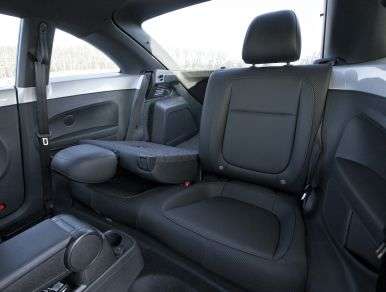
2013 Volkswagen Beetle TDI: Features and Controls
- The 2013 Volkswagen Beetle TDI is identical to the 2012 standard Beetle in terms of its available features and controls.
The 2013 Volkswagen Beetle TDI – at least the very basic model we drove – is largely bereft of any of the high tech gadgets or advanced features that have become increasingly common in the compact segment. Staring at the bare, button-less spokes of the Beetle’s steering wheel drives this point home even further. If you are looking for something more than a CD player and air conditioning, you are going to have to pay more money and ante up for a few options or trim upgrades over what the TDI has to offer. Even the AM/FM/CD system that came with the car was an exercise in frustration, as we were unable to parse its menu system in order to pair it with a mobile phone for Bluetooth streaming (and VW doesn’t provide an AUX-in jack). There is certainly something to be said for basic transportation, but the Beetle TDI is priced above cars that offer better amenities, which makes the de-contented feel of its interior that much harder to swallow.
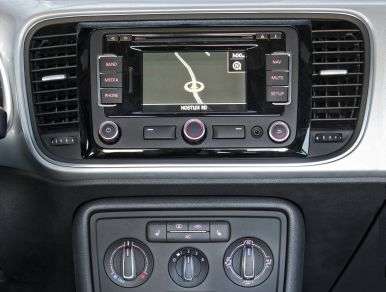
2013 Volkswagen Beetle TDI: Safety and Ratings
- The 2013 Volkswagen Beetle TDI is identical to the 2012 standard Beetle in terms of its safety equipment.
The 2013 Volkswagen Beetle TDI comes standard with dual forward airbags, side impact airbags for front seat passengers, and side curtain airbags that protect the heads of those occupying the front and rear seats. The Beetle TDI is also outfitted with electronic stability control and traction control free of charge.
2013 Volkswagen Beetle TDI Crash-Test Ratings: The National Highway Traffic Safety Administration has given the Volkswagen Beetle TDI a five-star side impact safety rating, as well as a four-star rollover rating. The Insurance Institute for Highway Safety has rated the Volkswagen Beetle TDI 'good' in front offset, side impact, rear crash protection, and roof strength tests.
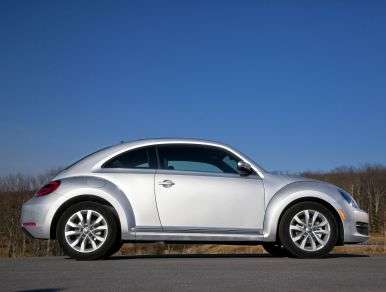
2013 Volkswagen Beetle TDI: Engines and Fuel Economy
- The 2013 Volkswagen Beetle TDI introduces a turbocharged diesel engine onto the options sheet.
The 2013 Volkswagen Beetle TDI comes with a 2.0-liter, four-cylinder turbodiesel engine that has been tuned to provide 140 horsepower and 236 lb-ft of torque, which is 40 additional horses and almost 50 lb-ft more twist than was found in the New Beetle’s diesel model. The EPA ranks the more robust diesel unit’s fuel consumption equally as impressive as that of the smaller mill it replaces: 28-mpg city and 38-mpg highway for the six-speed dual-clutch automated manual version of the car that we drove (add an extra 3-mpg for the standard six-speed manual on the highway).
Unfortunately for us – in more ways than one – the weather in Montreal during our time with the 2013 Volkswagen Beetle TDI was less than ideal, with the mercury in the thermometer dropping well below the freezing point and verging on the sub-Arctic in terms of wind chill. The cold temperatures and city-heavy driving were not kind to the TDI’s efficiency in our hands, as we recorded a surprisingly low 15-mpg. It’s possible that balancing this out with highway trips might have made a difference in the final fuel bill for the week, and also allowed the diesel engine to warm up to proper operating temperature. For those with short commutes in winter climates, however, it’s clear that there is a disconnect between factory testing and the toll exacted by very low temperatures on a drivetrain known for its fair weather efficiency.
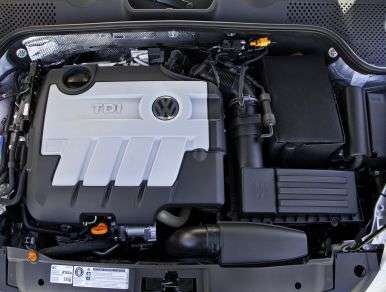
2013 Volkswagen Beetle TDI: Driving Impressions
The 2013 Volkswagen Beetle TDI presented us with a dual personality that had us pining for the warmer climes where we had driven previous turbodiesel VW models in the past. To put it simply, the VW Beetle TDI did not like the cold. Having already pointed out the car's uncharacteristic fuel consumption, we must also inform you of the balky behavior of its DSG automated manual transmission during its time in our care.
Normally, we are happy with the quick shifts provided by the computer-controlled gearbox, but the lower operating temperatures we exposed the Beetle TDI to introduced a significant lag when it automatically selected one forward cog or another, which had the car lurching forward in a distinctly unsmooth manner. Not only that, but the programmed 'creep' feature which allows the DSG unit to simulate the forward motion of a traditional torque converter tranny when one's foot is removed from the brake pedal was likewise jerky off of the line.
The Volkswagen Beetle TDI's lack of transmission response really put a dent in our ability to enjoy the normally bottomless torque that associated with its 236 lb-ft rating. Although not intended to be revved much past the 5,000 rpm mark, the engine is truly an excellent power plant that is well suited for commuting duties - were it backed by an old-school automatic, or even the standard six-speed manual. We simply can't recommend the DSG transmission in colder climates.
We were able to coax respectable handling from the Beetle TDI despite the slick, icy pavement we were forced to contend with, although the abrupt power delivery of the DSG system had us unexpectedly fending off torque steer from time to time. One won't be delighted in quite the same way as when piloting another well-sprung compact car from Volkswagen like the GTI hatchback, but the Beetle TDI is comfortable and confident at all speeds.
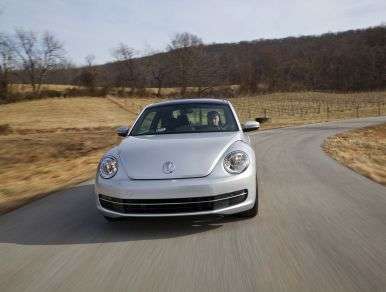
2013 Volkswagen Beetle TDI: Final Thoughts
The base 2013 Volkswagen Beetle TDI is an attractive compact coupe that drives well but falls short of expectations in terms of its interior trappings. It's well worth investigating higher trim levels of the TDI in order to benefit from a less spartan interior and gain the functionality of a much more modern stereo system.
Alternatively, if you live in a colder climate we recommend checking out either the base 2.5-liter, five-cylinder Beetle or the more robust 2.0-liter Turbo. Not only will you get more features for your money (as you won't be paying extra for the TDI engine), but you will also avoid shelling out extra cash for the promised fuel mileage that simply didn't materialize for us. Either way, make sure you go stick-shift or automatic when specing out your winter Beetle: the DSG tranny just can't cut it once the temperatures start to drop below freezing.
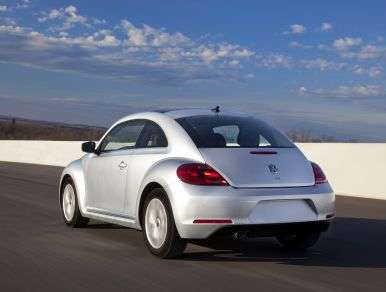
What We Like About The 2013 Volkswagen Beetle TDI
- Best-looking modern Beetle.
- Lots of torque from turbodiesel engine.
- Roomy front seats.
- Comfortable ride.
We Aren’t So Hot On
- Hesitation and jerky operation of DSG transmission in cold weather.
- Unable to meet advertised fuel economy during the winter.
- Barebones interior trim on base model.
